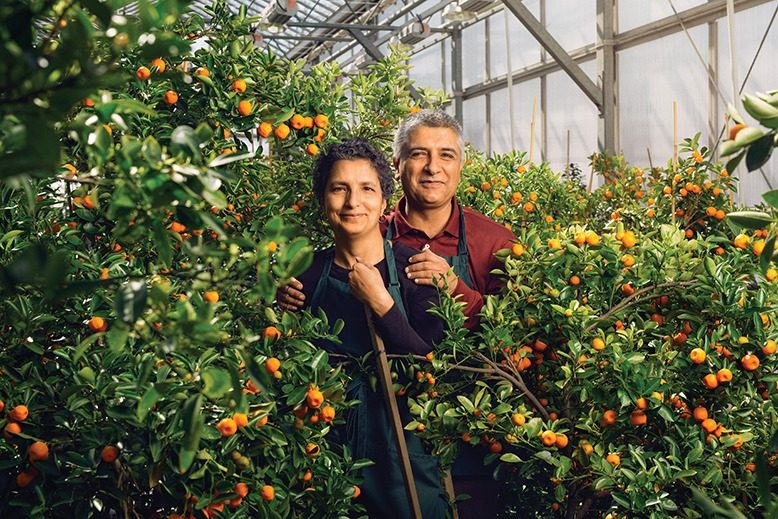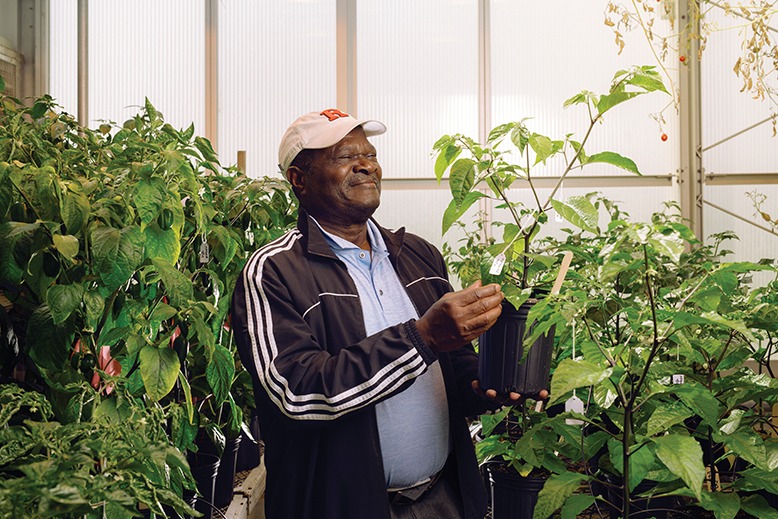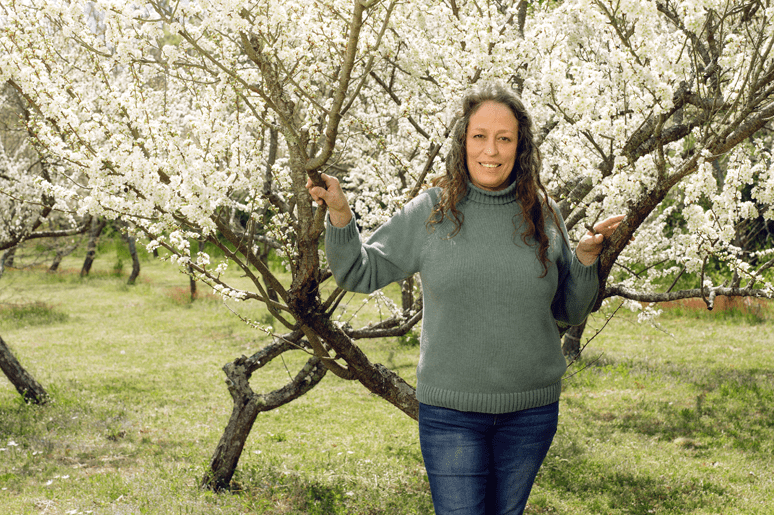
Sunshine-yellow yuzu, walnut-sized limequats and dark-green calamansi punctuated the hundreds of potted trees in Seema Malik’s greenhouse when the call came last fall. It was a friend of Martha Stewart’s—she and Stewart were on the road and wanted to stop by.
“We actually didn’t take it seriously,” says Malik, who, with her husband, Vivek, operates Bhumi Growers, a citrus farm in Bordentown. “We were like, Martha Stewart isn’t driving two hours each way to visit our little farm in the middle of New Jersey.”
Stewart, a New Jersey native and celebrity farmer who grows exotic citrus at her farm in Bedford, New York, did indeed visit. She also left a rave review that Malik posted on Instagram.
Malik is one of a growing number of specialty farmers in the Garden State raising niche crops and garnering frequent plaudits. Customers include chefs looking for new ingredients, ethnic groups searching for flavors from their home countries, and locals excited about tasting something new. “These unique crops are rising in demand in New Jersey,” says Douglas Fisher, the Garden State’s secretary of agriculture. “New Jersey farmers are regularly exploring ways to supply customers looking for new offerings.”
For the Maliks, it was love at first tart bite when they tasted fresh yuzu at an upscale Manhattan restaurant. It sent them on a quest, largely unsuccessful, to find the fruit. “The yuzu you could find was in bottles and pasteurized to make it shelf stable,” says Seema of the East Asian citrus fruit, which resembles a lemon and is prized for its zest and juice. “It had a hint of yuzu flavor, but it wasn’t real yuzu juice.”
After several years, the Maliks—both of whom formerly worked in finance—harvested enough fruit to satisfy their cravings and offer surplus to local restaurants. Chefs liked it and wanted more. “Chefs started asking, ‘Do you guys grow sudachi?’ or, ‘Have you considered growing calamansi?’” says Malik, referring to some of the 16 varieties of citrus she now grows on some 800 trees.
Malik’s citrus has found its way into ice cream at the Bent Spoon, as well as farm-to-table restaurant Elements, both in Princeton. The Referend Bier Blendery in Pennington makes a yuzu-infused ale, and Michelin-starred restaurants around the country order citrus fruit and blossoms. Malik estimates that 30 percent of her clients are in New Jersey.
[RELATED: Chef Chat: How Sufia Hossain Brings the Heat]
Growing citrus in New Jersey—classified as USDA Zone 6—means moving the trees into the greenhouse as temperatures start to fall. Malik estimates she loses up to 30 trees due to weather, but credits the climate with keeping them free of a disease commonly known as citrus greening that is wreaking havoc on groves in Florida and California. “From what we have learned speaking to researchers, we are actually ahead of the curve by being in a climate that doesn’t foster the disease,” she says.
Pricing is also a challenge. “We have new chefs who try to understand why they have to pay 5 to 10 times the price of a regular lemon,” says Malik. She has sent samples to restaurants so chefs can experience the flavors before discussing price. “The flavors in the yuzu are so intense that a little goes a long way.”
For restaurants open during Covid-19, Malik offered free citrus. “I put out a notice on Instagram saying that if you’re servicing your community and you’re still open, please call me and I’ll send you a box of citrus at no cost,” she says. “I’ve sent pounds of citrus.”
***
The state’s growing ethnic population is responsible for much of the interest in niche crops. New Jersey is the fourth most ethnically diverse state in the country, according to a 2020 report by WalletHub, a personal finance website. The two fastest-growing minorities in the state are Hispanic/Latino and Asian, which includes Indians.
Dr. Prab Tumpati started TIKSmart Farm in Pemberton five years ago to provide the Indian community with fresh organic produce, including bottle gourds, snake gourds and ridge gourds, as well as Indian pumpkins and chilies, and pick-your-own gongura, a leafy green vegetable popular in south-central Indian cuisine. The produce is sold exclusively on weekends at the farm.
“We are originally from India, and there is a big diaspora in northeastern New Jersey, especially where our farm is located,” says Tumpati, a pulmonologist specializing in weight loss and nutrition. He owns the farm with partners who are also in the medical profession.
From the outset, Tumpati’s concern was whether anyone would visit the farm stand. They did. “Word of mouth worked better than we expected,” he says. “Once people saw the crops, they brought their friends.” Today, the farm draws customers from throughout New Jersey and beyond.
Creating demand for a specialty crop is essential for New Jersey niche growers. “We have the most expensive farmland, the highest taxes, and a lot of regulations,” says Richard VanVranken, head of the Atlantic County Extension Department at the Rutgers New Jersey Agricultural Experiment Station. “They have to try crops that will produce a good income, whether that means using unusual crops or taking advantage of our proximity to this massive mid-Atlantic population surrounding us.”

Albert Ayeni leads the Exotic Pepper Project at Rutgers, where researchers help determine which crops are best-suited for growing conditions in New Jersey. Photo by Jauhien Sasnou
Ethnic crops with cross-cultural appeal offer growers an even greater opportunity. That’s the driving force behind the Ethnic Crop Research Group at Rutgers. “We identify a crop that we believe has significant commercial value in New Jersey,” says Albert Ayeni, PhD, an ethnic-crop research specialist with the group. “Then we look at different varieties and characterize them—nutritional quality, yield and handling issues, perishability, conditions that will maximize the production of that crop.” The group tests exotic crops—such as gongura, okra, tropical spinach and tigernuts—to determine those best suited to growing conditions in the Garden State before releasing them to farmers.
Another of those crops is exotic peppers. “People from the tropics—from Africa, Central America, Asia—they have many types of peppers in their diets,” says Ayeni, who leads the Exotic Pepper Project at Rutgers. “If we can grow these in New Jersey, they won’t have to be imported, and consumers get fresh local peppers at the peak of freshness.”
The project aims to adapt hot-pepper varieties not traditionally grown in New Jersey to the region’s climate and develop new strains that appeal to multiple ethnic groups, and eventually to a wider range of consumers.
 Four years ago, the project released its first new variety to the public, the pumpkin habanero, a small orange pepper resembling a miniature pumpkin with a tangerine taste, created by crossing African and Mexican habanero strains. “What’s unique about the pumpkin habanero is that we developed it bearing in mind that the average person in New Jersey doesn’t like something extremely hot, painfully hot. They want a mild habanero with all its nutritional qualities,” says Ayeni. Today, the pepper is grown in home gardens and on a small commercial scale, and can be found in ethnic markets.
Four years ago, the project released its first new variety to the public, the pumpkin habanero, a small orange pepper resembling a miniature pumpkin with a tangerine taste, created by crossing African and Mexican habanero strains. “What’s unique about the pumpkin habanero is that we developed it bearing in mind that the average person in New Jersey doesn’t like something extremely hot, painfully hot. They want a mild habanero with all its nutritional qualities,” says Ayeni. Today, the pepper is grown in home gardens and on a small commercial scale, and can be found in ethnic markets.
Working out of the university’s Agricultural Research and Extension Center in Bridgeton, Ayeni and a team of researchers breed varieties of jalapeños, habaneros and African bird’s eye, a small hot pepper found in the African wild. Ayeni plans to eventually plant them in fields at different locations in the state.
Ayeni envisions a day when ethnic crops move from niche markets to farmers markets to grocery stores. Consumers will begin to recognize them, try ethnic dishes containing them, and add the products to their own favorite dishes. Says Ayeni: “My goal is to make them household names.”
***
Some fruits that might be considered exotic are actually native to New Jersey. These include beach plums, familiar at the Jersey Shore, and aronia berries, which were used by early Native Americans. Thanks to South Jersey agriculture agents, growers are embracing them as viable crops.
If not for a Cape May County agricultural agent suggesting beach plums as a commercial crop 15 years ago, Alma George and her husband, John, might still be growing Christmas trees at Jalma Farms, their 130-acre spread in Dennis Township. The agent invited the couple to the Cape May Plant Materials Center of the USDA Natural Resources Conservation Service to learn about beach plum cultivars suited to commercial production. “Without them, we probably never would’ve even considered growing beach plums,” says George, who today grows more than 2,000 trees, making Jalma the largest beach plum farm in the state.

Alma George learned about beach plums 15 years ago. Now, her Dennis Township farm has more than 2,000 trees and is the state’s largest grower of the tart, purple fruit. Photo by Jauhien Sasnou
The small, tart, purple fruit grows on shrub-like trees in salty air and sandy soil; 10 years ago, it was named Cape May County’s official fruit. “For as long as we’ve been here, there have been niche cottage industries where people would get them in the wild and make jellies and jams and cordials—things like that,” says George, whose farm has been in her family for more than 300 years.
With assistance from the agricultural agent, the couple purchased commercially cultivated trees from a nursery in South Jersey. While John was completing the transaction, he struck up a conversation with the owner about another fruit-bearing native called aronia, commonly known as black chokeberry. “We thought it was a weed,” says George. “But Native Americans used it fresh. They knew when to pick it—when it’s slightly wrinkled, it’s sweetest. They dried them and had them for the winter. We should have paid attention to them.”
John’s research on aronia farming led him to articles only in Polish and German. He eventually discovered that the aronia berry has more antioxidants than blueberries; in 2010, the couple began planting aronia shrubs. Today, Jalma Farms has more than 8,000 aronia plants. The berries are used in a wine made by Natali Vineyards in Cape May Court House, and a gin produced by Little Water Distillery in Atlantic City.
[RELATED: Will the New Jersey Blueberry Fall Victim to Climate Change?]
The pandemic and a storm that flattened some beach plum trees made for a tough year, but George says she’s back on track, selling her homemade beach plum and aronia jams and jellies at Stainton’s in Ocean City, Bread & Cheese Cupboard in Stone Harbor, Cape May Honey Farm and farmers markets in Sea Isle City, Ocean City and Brigantine.
In addition to a growing interest in products that are new and local, George says, people express curiosity about her and the farm. “They want a story of that local farmer making it.”
